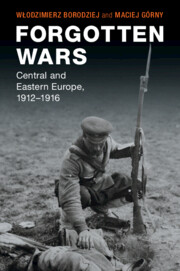Book contents
- Forgotten Wars
- Studies in the Social and Cultural History of Modern Warfare
- Forgotten Wars
- Copyright page
- Contents
- Figures
- Maps
- Capsules
- Additional material
- Introduction
- Part I The Fronts
- 1 The Road to War
- 2 Prelude: The Balkans 1912–1913
- 3 Before the Leaves Fall from the Trees …
- 4 Breakthrough
- Part II The Rear
- Part III Occupation
- Afterword
- Select Bibliography
- Index
4 - Breakthrough
from Part I - The Fronts
Published online by Cambridge University Press: 15 March 2021
- Forgotten Wars
- Studies in the Social and Cultural History of Modern Warfare
- Forgotten Wars
- Copyright page
- Contents
- Figures
- Maps
- Capsules
- Additional material
- Introduction
- Part I The Fronts
- 1 The Road to War
- 2 Prelude: The Balkans 1912–1913
- 3 Before the Leaves Fall from the Trees …
- 4 Breakthrough
- Part II The Rear
- Part III Occupation
- Afterword
- Select Bibliography
- Index
Summary
In March 1916 General Aleksei Alekseevich Brusilov was appointed commander of the Russian Southwest Front. He had been one of the most effective Russian commanders in the summer of 1914, and it was his army that had occupied Lwów in September. During the ‘great retreat’ in the spring of 1915 Brusilov once again proved himself to be able and level-headed. A year later he was seen as the man who was to change the course of the war on the Eastern Front.
In the first years of the war the Russian generals understood that without a huge increase in munitions production Czarism was doomed to fail. The army lacked everything. Only 10 per cent of the new recruits in the spring of 1915 received rifles. In March of that year, as the fighting ended in the Carpathians, Brusilov reported that his regiments were at between 25 and 50 per cent of their original strength.
- Type
- Chapter
- Information
- Forgotten WarsCentral and Eastern Europe, 1912–1916, pp. 138 - 158Publisher: Cambridge University PressPrint publication year: 2021

